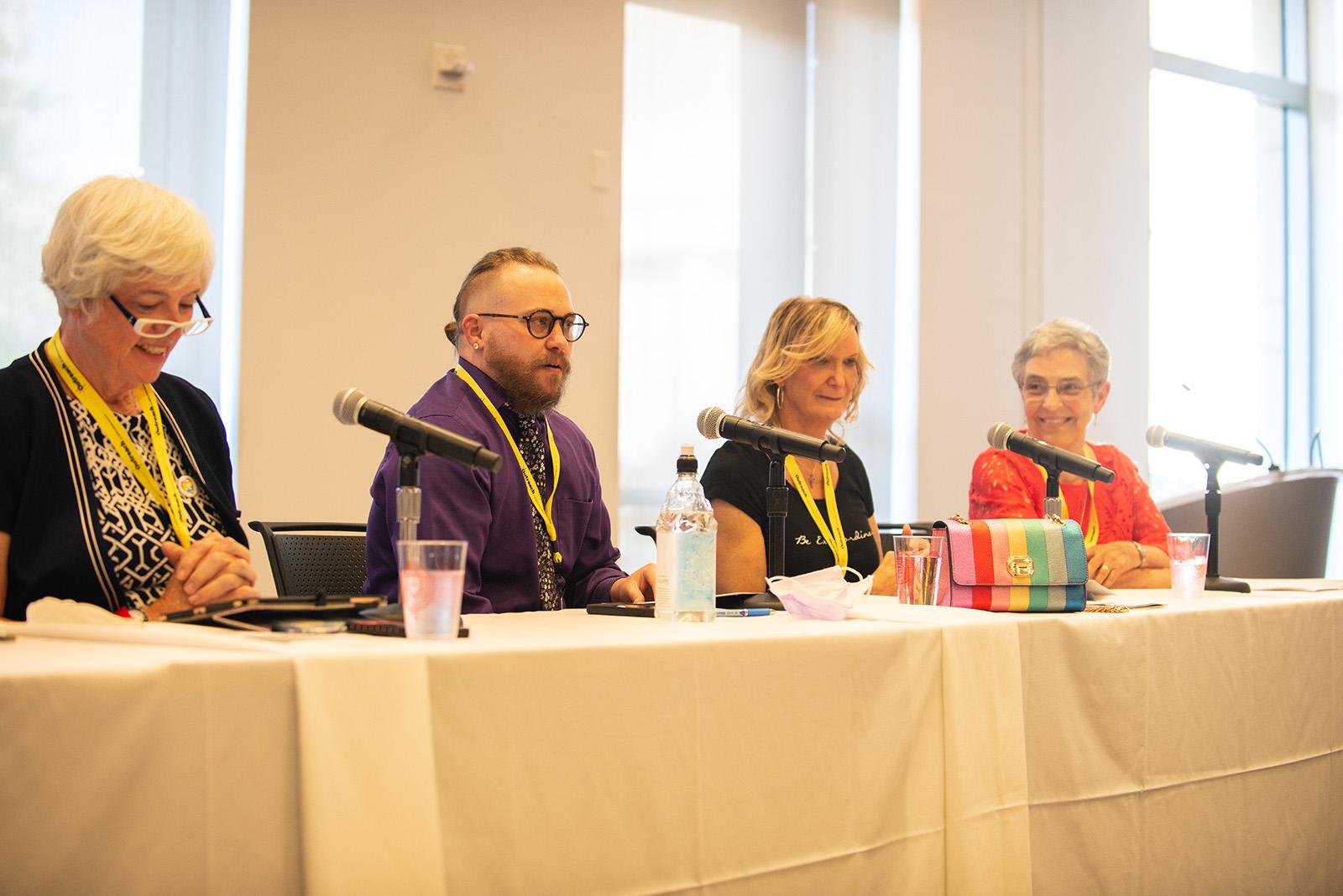The first time Dawn came to visit me, she was nervous. But after a while, she began to relax and poured out her story. She talked and talked, never taking one bite of her lunch. I will never forget her response when I encouraged her to eat: “I’m not hungry for food. I’m hungry to be seen for who I am. I’m hungry to be listened to and not judged.”
For over 20 years, as part of my ministry with them, I have prayed that transgender people would be seen by others as I see them, and much more importantly, that they be seen as God sees them.
Transgender people are who they say
During fetal development, a person’s brain, as well as their genitals, are formed by the influence of hormones at various times during the period of gestation. For most of us, these are aligned, which means that our genitals match how we sexually identify. However, for about one percent of the population, they do not match.
In trying to explain this dysphoria between their body and brain, it’s not uncommon for transgender people to say they “feel” like a man or a woman. Unfortunately, that has often been misinterpreted to refer to emotional feelings and has led to accusations that trans people are choosing to act on superficial feelings or whims. Nothing could be further from the truth.
Being transgender is not a choice at all. What trans people are expressing is the brain signal they receive that dictates their internal sense of gender identity. While there is a lot we don’t yet understand about being transgender, there is an abundance of reputable medical evidence to verify the reality of transgender people’s experiences.
A major tenet of a prevailing narrative is that transgender people are delusional and “sinning” by claiming to be transgender and, as a consequence, they suffer depression, broken relationships, addiction, self-harm and suicide. What I have witnessed in my ministry hundreds of times, up close and personal, is that transgender people experience all of this because they try to suppress who they are, and because of the pervasive rejection they experience from those who give meaning to their lives.
But when they make the decision to live from a place of truth and integrity, I experience the gifts of the Spirit in them: more peace, joy, compassion, wisdom, inner freedom and an ability to receive and offer genuine love.
“What I have witnessed hundreds of times, up close and personal, is that transgender people experience [psychological distress] because they try to suppress who they are, and because of the pervasive rejection they experience from those who give meaning to their lives.”
Transitioning is a spiritual journey
St. Francis of Assisi was once overheard by a Franciscan brother saying in prayer, “Who are you, my God, and who am I?” This is the fundamental spiritual question, and one that takes a lifetime to answer. It’s extremely difficult to be in relationship with another while at the same time hiding from oneself. Whether we use the language of spirituality or not, when we seek to live in the truth of our lives, we are moving closer to God. And so are transgender people.
I have witnessed transgender people’s incredible courage and faith in the pursuit of living an authentic and honest life. It is what we call transformation in God, a conversion of life. On the way to being whole and holy, we all go through the same stages in some way. We spend many years making sense of who we are and how we live.
But there are times when the narrative of our life is significantly challenged and we experience a crisis. Our former views begin to crumble. Gradually, we begin to live into a more authentic life. This is true for transgender people as well, but it is far more challenging for them.
What is reflected back to them repeatedly is that others see them in one gender, and they experience themselves as another gender. Though they often spend years trying to be who others say they are, they simply cannot shake loose the mysterious knowing that this is who they are, and neither they nor anyone else can change it. A trans person named Taylor often told me, “I’d rather be hated for who I am than loved for who I am not.”
Usually, through the fidelity of prayer and years of hard work to know themselves, they come to know that they can no longer pretend to be someone they are not. So, at the risk of losing their family, friends, career and faith community, they claim their truth openly.
Sara, a concert pianist, recounted to me, “In the tumultuous two and a half years that followed my decision to transition, friends abandoned me, concert dates evaporated, and I lost my teaching job.” Listen to the words of the philosopher Søren Kierkegaard: “The most common form of despair is not being who you are.”
Gradually, as trans people make their way through the painful and complex stages of transition unique to each person, self-hatred is replaced by self-love, self-doubt is replaced by confidence in themselves. They have made the passage from what was death-dealing to what can now be life-giving.
Chris expressed it this way: “I sat on my meditation cushion and cried some tears that I wasn’t sure were grief or gratitude. I felt bigger than my body, and said to the Divine Presence: ‘I’ve been looking for you.’ And I knew in that moment that I had not been the only one seeking. God was saying it back to me.”
“A trans person named Taylor often told me, ‘I’d rather be hated for who I am than loved for who I am not.'”
We Catholics can support transgender people
Trans people, many of them baptized Catholics, are as much part of the Body of Christ as any of us. We are responsible and privileged to walk with them in their seeking to live truth of their lives. As Pope Francis often reminds us, we are called to accompany all who seek God. However, we cannot accompany people while at the same time refusing to believe what they say about the experience of their own lives.
Also, we believe that our lives are meant to image the life of the Trinity. Our rich spiritual theology of the Trinity speaks of the mutual, reciprocal relationship of love among the Father, Son and the Holy Spirit, who are one being and yet distinct persons. Loving relationships are at the heart of imaging God. If we model the life of the Trinity, why should being many and being one in loving relationships be so threatening?
In addition, the development of doctrine and the primacy of conscience are well established Catholic teachings. The Second Vatican Council made it clear that God’s actions in our lives are revealed not only in Scripture and church tradition, but also in the developments of science, and especially from the witness of peoples’ own lived experiences. It’s precisely the fidelity of our lives in God that invites the development of the teachings that guide our faith.
Transgender people have much to teach us
It takes humility and courage to travel outside of our comfort zone and learn from people whose lives seem different from our own, or whose lives challenge our long-standing beliefs about God and about who we are as human beings. But this is what human and Christian maturity demands.
“I have witnessed transgender people’s incredible courage and faith in the pursuit of living an authentic and honest life. It is what we call transformation in God, a conversion of life.”
Many transgender people have experienced profound and sustained discrimination and rejection from the Catholic Church, yet they remain faithful to a church that isn’t faithful to them. Still, they stay and continue to help us understand them. They can teach us a great deal about the commitment to live with integrity. They can also teach us about fidelity to God and to our faith community.
Many transgender people have learned the wisdom that comes with letting go of what they cannot control, letting go of material possessions and worldly honor. They can teach us how to be at peace and content with what matters most in life—living with integrity.
Throughout the Gospels, Jesus places before us people and circumstances that reveal the Reign of God in unexpected ways. Trans people challenge us to expand the circle of who we allow to reflect God in our world. They challenge us to live by what we say we believe—that all are the dwelling place of God. Our Benedictine brother, John Main, said it well: “There is really only one mystery, one truth, one suffering, one love, one life and it is just showing itself in different forms.”
I’d like to end with an affirmation of Cardinal Wilton Gregory to a trans man in 2019, because it is the posture we all should take to all of God’s precious people. At a Theology on Tap, Rory asked the cardinal if there is a place for him and his queer friends in the church.
Cardinal Gregory responded, “You belong to the heart of this church. There is nothing that you may do, may say, that will rip you from the heart of this Church.”



